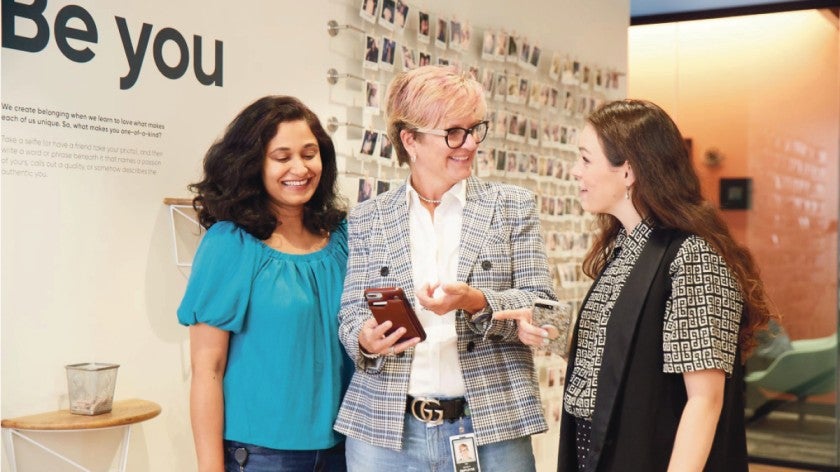Early in my career, I ran human resources for a large engineering and product organisation. I was the only woman on that team. I also happened to be a new mom.
When I returned to the team after my maternity leave, I had to figure out how to balance my role as a leader with my mum status, including how to find time for all the things that come after giving birth. Hint: several of them were too uncomfortable to talk about at the office. Like racing home if my baby got sick. Or leaving a little early to take him to the doctor.
I had always had a heart for people. But it was during this time that I realised even more how new perspectives, different points of view and more voices speaking their unique ideas would build healthier companies.
Diversity of thought and perspective makes us all smarter. That’s one of the reasons why women in the workplace, at all levels, are critical for companies to be better versions of themselves.
For instance, because the majority of working women have broader care-giving responsibilities than working men, evidenced by McKinsey & Company and LeanIn.org, women tend to think with more empathy and compassion.
At work, this shows up in how women influence the ways companies treat leaves of absence, returning to work and healthcare coverage. This need to support family, to support life, causes women to speak up and ask for support.
Women in the workplace, at all levels, are critical for companies to be better versions of themselves
Throughout my career, I’ve seen women, because of their different skills and experiences, push companies in ways that hadn’t been previously considered, which helps create healthier environments for everyone.
As women advance in their careers, they also have a more equitable ability to pull other women up around them. These women create differentiated opportunities for learning and coaching. They bring a creative mindset to the table that often doesn’t involve networking over a game of golf or beers.
By helping other women better navigate their careers, women leaders expose more women to new opportunities that might have otherwise stayed hidden. Again, a benefit to everyone.
None of this is meant to elevate women’s experiences or points of view over those of men. Rather, it’s to make the point that the more skills and perspectives companies bring together, the more they can offer equal care and make sure all employees have the resources they need.
Culture of belonging and magic of authenticity
Women at work, especially women of colour, have a hard time feeling like they fit in if they’re what’s called “onlys”, a concept coined by McKinsey and LeanIn.org. When a woman is the only one in a company, she’s not going to feel like her voice matters. She won’t push as hard, she’s not going to participate in the jokes and, ultimately, the company she works for will lose the magic she would otherwise bring.
To help on this front, I believe in creating a culture of “belonging” at work, where employees know they’re not alone and they have people around them who care, where they can be their authentic selves without fear and with the understanding that their voices will receive respect.
At its core, a culture of belonging offers true psychological safety to talk about and feel supported even when personal life bleeds into work life. As we all know, work-life “integration” is more realistic than work-life “balance”.
Without that psychological safety, women with children, for example, will often mask who they really are at work to avoid anyone thinking they can’t juggle everything or they are not as committed to their role. Masking can be an even bigger challenge for single women, who have different priorities and activities during and after work, which unfortunately tend not to hold the same weight as those related to childcare.
But just as working mums have pushed their companies for better benefits, the single-woman perspective has also evolved what companies offer. When I was at LinkedIn, for example, we created the Perk Up programme of flexible benefits that employees could apply to other activities outside childcare. It told everyone: “My life matters equally”. It let all employees trust that they could choose to be their full selves without judgment about their capabilities.
As an HR leader, I care about the whole person. I care about their families, their experiences, their quality of life. This shapes who employees are and how they find their voices at work. It makes companies healthier and better for everyone.
Here’s my advice, no matter what phase of life you’re in: set clear boundaries and be confident in them. It’s OK for you to pursue your quality of life transparently. Find a culture where you feel like you can belong. Be you.
Share personal stories on your belonging moment. That will educate others and can help reduce micro-aggressions in the workplace, which in turn will reduce the strain on mental health at work.
In return, you’ll be braver and bolder with your lifestyle and activities, and experience more joy. Your perspectives will help create cultures where everyone has the ability to be themselves and have the champions they need in the workplace. Your voice will help the team get smarter as they debate rich differing opinions. In the end, you will not only transform your career and perhaps your company, but by leading your life this way, you can help transform the world.
This article is also published on Thrive Global.
For more information please visit www.servicenow.com

